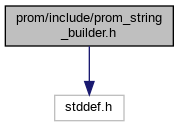A StringBuilder: uses an internal buffer to append strings and characters as needed and keeps track of the constructed string, grows the buffer by factor 2 automagically. More...
#include <stddef.h>
Go to the source code of this file.
Typedefs | |
| typedef struct psb | psb_t |
Functions | |
| psb_t * | psb_new (void) |
| Setup a new string builder. More... | |
| int | psb_destroy (psb_t *self) |
| Destroys the given string builder. More... | |
| int | psb_add_str (psb_t *self, const char *str) |
| Append the given string to the buffered string of the given string builder. More... | |
| int | psb_add_char (psb_t *self, char c) |
| Append the given character to the buffered string of the given string builder. More... | |
| int | psb_clear (psb_t *self) |
Free the allocated string buffer area of the given string builder, allocate a new one with a default initial size and set its length to 0. More... | |
| int | psb_truncate (psb_t *self, size_t len) |
Set the length of the buffered string of the given string builder to the given length and append '\0'. More... | |
| size_t | psb_len (psb_t *self) |
| Get the length of the buffered string of the given string builder. More... | |
| char * | psb_dump (psb_t *self) |
| Get a copy of the buffered string of the given string builder. More... | |
| char * | psb_str (psb_t *self) |
| Get a reference to the buffered string. More... | |
Detailed Description
A StringBuilder: uses an internal buffer to append strings and characters as needed and keeps track of the constructed string, grows the buffer by factor 2 automagically.
- Note
- All
psb_tparameter in the related functions are expected to be !=NULL, otherwise be prepared for core dumps.
Function Documentation
◆ psb_add_char()
| int psb_add_char | ( | psb_t * | self, |
| char | c | ||
| ) |
Append the given character to the buffered string of the given string builder.
- Parameters
-
self Where to append the character. c Character to append.
- Returns
0on success, a number > 0 otherwise.
◆ psb_add_str()
| int psb_add_str | ( | psb_t * | self, |
| const char * | str | ||
| ) |
Append the given string to the buffered string of the given string builder.
- Parameters
-
self Where to append the string. str String to append.
- Returns
0on success, a number > 0 otherwise.
◆ psb_clear()
| int psb_clear | ( | psb_t * | self | ) |
Free the allocated string buffer area of the given string builder, allocate a new one with a default initial size and set its length to 0.
- Parameters
-
self String builder to free.
- Returns
0on success, a number > 0 otherwise.
◆ psb_destroy()
| int psb_destroy | ( | psb_t * | self | ) |
Destroys the given string builder.
- Parameters
-
self String builder to destroy.
- Returns
0.
◆ psb_dump()
| char* psb_dump | ( | psb_t * | self | ) |
Get a copy of the buffered string of the given string builder.
- Parameters
-
self String builder to ask.
- Returns
- Metric as string in Prometheus exposition format.
- Note
- The returned string must be freed when no longer needed.
◆ psb_len()
| size_t psb_len | ( | psb_t * | self | ) |
Get the length of the buffered string of the given string builder.
- Parameters
-
self String builder to query.
- Returns
- The length of the buffered string.
◆ psb_new()
| psb_t* psb_new | ( | void | ) |
Setup a new string builder.
- Returns
- A new string builder or
NULLon error.
◆ psb_str()
| char* psb_str | ( | psb_t * | self | ) |
Get a reference to the buffered string.
One should NOT modify the string, treat it as a read-only and never ever free() it, otherwise be prepared for buffer overflows and core dumps. It has been made public solely to avoid the strdup() overhead of psb_dump().
- Returns
- a string, or
NULLif not initialized yet.
◆ psb_truncate()
| int psb_truncate | ( | psb_t * | self, |
| size_t | len | ||
| ) |
Set the length of the buffered string of the given string builder to the given length and append '\0'.
- Parameters
-
self String builder to truncate. len The new length of the buffered string. If it is bigger than its current length, this function is a no-op.
- Returns
0on success, a number > 0 otherwise.
 1.8.13
1.8.13